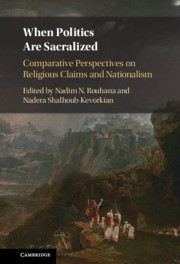32 results
Figures
-
- Book:
- When Politics are Sacralized
- Published online:
- 10 June 2021
- Print publication:
- 27 May 2021, pp vii-vii
-
- Chapter
- Export citation
Part VIII - Palestine
-
- Book:
- When Politics are Sacralized
- Published online:
- 10 June 2021
- Print publication:
- 27 May 2021, pp 363-386
-
- Chapter
- Export citation
Maps
-
- Book:
- When Politics are Sacralized
- Published online:
- 10 June 2021
- Print publication:
- 27 May 2021, pp viii-viii
-
- Chapter
- Export citation
1 - A Comparative Perspective on Religious Claims and Sacralized Politics
-
-
- Book:
- When Politics are Sacralized
- Published online:
- 10 June 2021
- Print publication:
- 27 May 2021, pp 1-30
-
- Chapter
- Export citation
Part VII - Northern Ireland
-
- Book:
- When Politics are Sacralized
- Published online:
- 10 June 2021
- Print publication:
- 27 May 2021, pp 307-362
-
- Chapter
- Export citation
Copyright page
-
- Book:
- When Politics are Sacralized
- Published online:
- 10 June 2021
- Print publication:
- 27 May 2021, pp iv-iv
-
- Chapter
- Export citation
Part V - Iran
-
- Book:
- When Politics are Sacralized
- Published online:
- 10 June 2021
- Print publication:
- 27 May 2021, pp 245-272
-
- Chapter
- Export citation
Part I - Israel
-
- Book:
- When Politics are Sacralized
- Published online:
- 10 June 2021
- Print publication:
- 27 May 2021, pp 31-158
-
- Chapter
- Export citation
Part II - India
-
- Book:
- When Politics are Sacralized
- Published online:
- 10 June 2021
- Print publication:
- 27 May 2021, pp 159-184
-
- Chapter
- Export citation
Part IV - Serbia
-
- Book:
- When Politics are Sacralized
- Published online:
- 10 June 2021
- Print publication:
- 27 May 2021, pp 213-244
-
- Chapter
- Export citation
Part VI - Saudi Arabia and Wahhabism
-
- Book:
- When Politics are Sacralized
- Published online:
- 10 June 2021
- Print publication:
- 27 May 2021, pp 273-306
-
- Chapter
- Export citation
3 - Religious Claims and Nationalism in Zionism
- from Part I - Israel
-
-
- Book:
- When Politics are Sacralized
- Published online:
- 10 June 2021
- Print publication:
- 27 May 2021, pp 54-87
-
- Chapter
- Export citation
Preface and Acknowledgments
-
- Book:
- When Politics are Sacralized
- Published online:
- 10 June 2021
- Print publication:
- 27 May 2021, pp xv-xviii
-
- Chapter
- Export citation
Index
-
- Book:
- When Politics are Sacralized
- Published online:
- 10 June 2021
- Print publication:
- 27 May 2021, pp 387-396
-
- Chapter
- Export citation
Part III - Sri Lanka
-
- Book:
- When Politics are Sacralized
- Published online:
- 10 June 2021
- Print publication:
- 27 May 2021, pp 185-212
-
- Chapter
- Export citation
Contributors
-
- Book:
- When Politics are Sacralized
- Published online:
- 10 June 2021
- Print publication:
- 27 May 2021, pp x-xiv
-
- Chapter
- Export citation
Contents
-
- Book:
- When Politics are Sacralized
- Published online:
- 10 June 2021
- Print publication:
- 27 May 2021, pp v-vi
-
- Chapter
- Export citation
Tables
-
- Book:
- When Politics are Sacralized
- Published online:
- 10 June 2021
- Print publication:
- 27 May 2021, pp ix-ix
-
- Chapter
- Export citation

When Politics are Sacralized
- Comparative Perspectives on Religious Claims and Nationalism
-
- Published online:
- 10 June 2021
- Print publication:
- 27 May 2021
Copyright page
-
- Book:
- Israel and its Palestinian Citizens
- Published online:
- 16 February 2017
- Print publication:
- 30 January 2017, pp iv-iv
-
- Chapter
- Export citation



